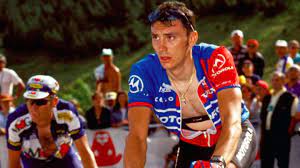
The Tour de France is one of the most competitive and challenging competitions for any cyclist, even if you are the 1992 individual road race Olympic gold medalist, such as 24-year-old Fabio Casartelli.
After his Olympic Gold medal win, Casartelli turned professional the following year, competing in international races such as the Tour de Suisse, the Spanish Clasica de Almeria, and the Giro d’Italia, winning and placing in decent positions.
He was selected to ride in the 1995 Tour de France and even from the beginning of the race, other competitors were aware of the breakneck speed that he was pursuing on every leg.
It was on the short descent on July 18, 1995, on the 15th stage of the race, called the Queen Stage, in the Pyrenees mountains, that the accident happened. With the speed that the athletes achieve going downhill, all bunched together, there is no margin of error if something unforeseen happens – which it did on that fateful day.
All it took was one small misjudgment, one slight brush of tires, and the cascading domino effect became unavoidable. Speeding cyclists behind collided with the fallen riders in front, attempts to avoid the crash only added to the pile-up, and for some it happened so fast that there was no way they could avoid what they could see coming.
It was a catastrophe.

Riders caught in the worst of it suffered fractures, serious cuts, one had to be rescued after falling into the ravine beyond the concrete barriers, and another rider had to be immediately evacuated with life-threatening injuries.
Casartelli suffered the worst out of everyone. Caught in the thick of it, he went straight over his handlebars, colliding insanely with one of the blocks at the side of the road. He sustained severe facial injuries and a brutal blow to his head that knocked him unconscious, leaving him in a spreading pool of blood.
Medics rushed to his side, administered what aid they could on site then evacuated him by helicopter to the Taberes hospital. There, he was pronounced dead not long after arrival.
Conflicting reports abounded soon after his death about the debate of professional cyclists having to wear helmets. Those against argued about the discomfort of wearing the helmets in hot weather, while others simply suggested that had Casartelli been wearing a helmet, the critical blow to his head would not have been fatal.

The debate was a typical discussion about safety over comfort, but, in reality, it was mainly about change, about becoming accustomed to wearing the helmet. Unfortunately, it took the death of another cyclist in Paris-Nice for it to become mandatory in 2003, finally, but too late to save the life of 24-year-old Fabio Casartelli.
